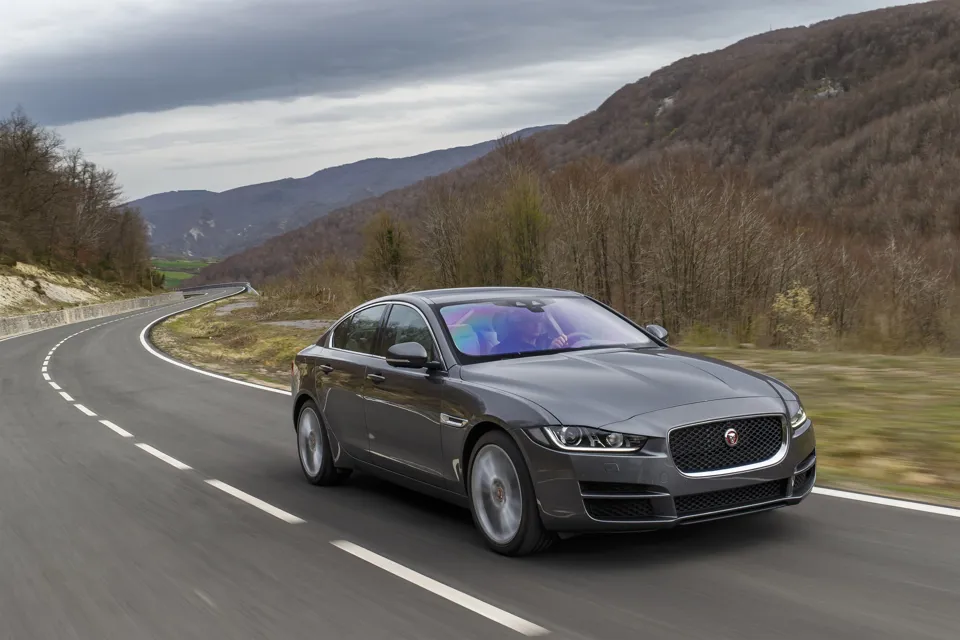Jaguar Land Rover (JLR) is predicting its true fleet sales – those to leasing companies and end-user fleets – will grow by 50% this year compared with 2015, with further double-digit growth expected through to 2020.
The introduction of business-friendly models, including the XE and XF, with CO2 from 99g/km, helped the manufacturer achieve a record-breaking 2015.
However, with both models continuing to gain traction in the fleet market, and one in six sales of the new F-Pace expected to be registered to fleet, records are predicted to tumble again this year.
JLR’s total true fleet registrations were up 50% last year, with the manufacturer registering 21,034 units compared with 14,056 in 2014.
Jaguar registered 6,562 vehicles to fleet – up 49% year-on-year – and Land Rover fared even better, with 14,472 units registered, compared with 9,659 in 2015 – an increase of 67%.
JLR managing director Jeremy Hicks told Fleet News: “Our fleet and business 2015 results are fantastic and prove we have an effective formula in place.
“We have desirable and sector-appropriate cars, efficient Ingenium engines and class-leading total cost of ownership – together, these factors deliver a compelling proposition for fleet managers to add Jaguar Land Rover to their fleet lists.
“With this formula in mind, and an ever expanding range of stunning Jaguar and Land Rover vehicles on the horizon, I’m confident that there’s plenty more fleet growth to come.”
His confidence appears well-placed, with fleet registrations for Q1 showing sales up by 84% compared to the first three months of 2015.
Jaguar saw fleet sales grow by 194% from Q1 2015 to Q1 2016, while Land Rover’s performance from January to March was so strong that one in three fleet cars sold in sectors the brand competes in was a Land Rover. The Range Rover Evoque was the star performer in Q1, outselling all of its premium rivals with 18.3% of fleet sales.
“Our Q1 2016 sales are a great example of the fleet-suitability that many of our new vehicles have,” said Jon Wackett, general manager for fleet and business at JLR.
“We’ve really disrupted a market that has been traditionally dominated by three or four brands by introducing extremely desirable cars that represent real-world value for money.
“We are strategically aiming to balance volume of sales against maintaining strong residual values which is a core buying decision for our existing and future customers.”
At the heart of JLR’s fleet and business sales success are the technologies that underpin the range. Aluminium construction and its Ingenium engines have ensured there are both financial and an emotional reasons to opt for a Jaguar or a Land Rover, argues Wackett.
The Ingenium engine was launched initially in the Jaguar XE in April 2015 and was followed quickly by the Discovery Sport. They are manufactured at the company’s new £500 million engine manufacturing centre in the west midlands, which is set to produce 450,000 Ingenium engines each year.
It is one of JLR’s four UK-based manufacturing facilities. Together with its R&D centres in Coventry and Gaydon, it has invested £11 billion in product creation and facilities, creating more than 20,000 new jobs in the last five years. And, in addition to the record level of investment in facilities, JLR has also invested in its corporate sales structure.
A dedicated field-based sales team has been introduced across 50 Jaguar and Land Rover retailers, supported by a further 22 people and led by five senior-level managers responsible for fleet and business sales.
Wackett concluded: “It is the team’s efforts right throughout the organisation that has pulled these results together.
“We’re not complacent – and the customer remains pivotal to everything that we do.”




















Login to comment
Comments
No comments have been made yet.